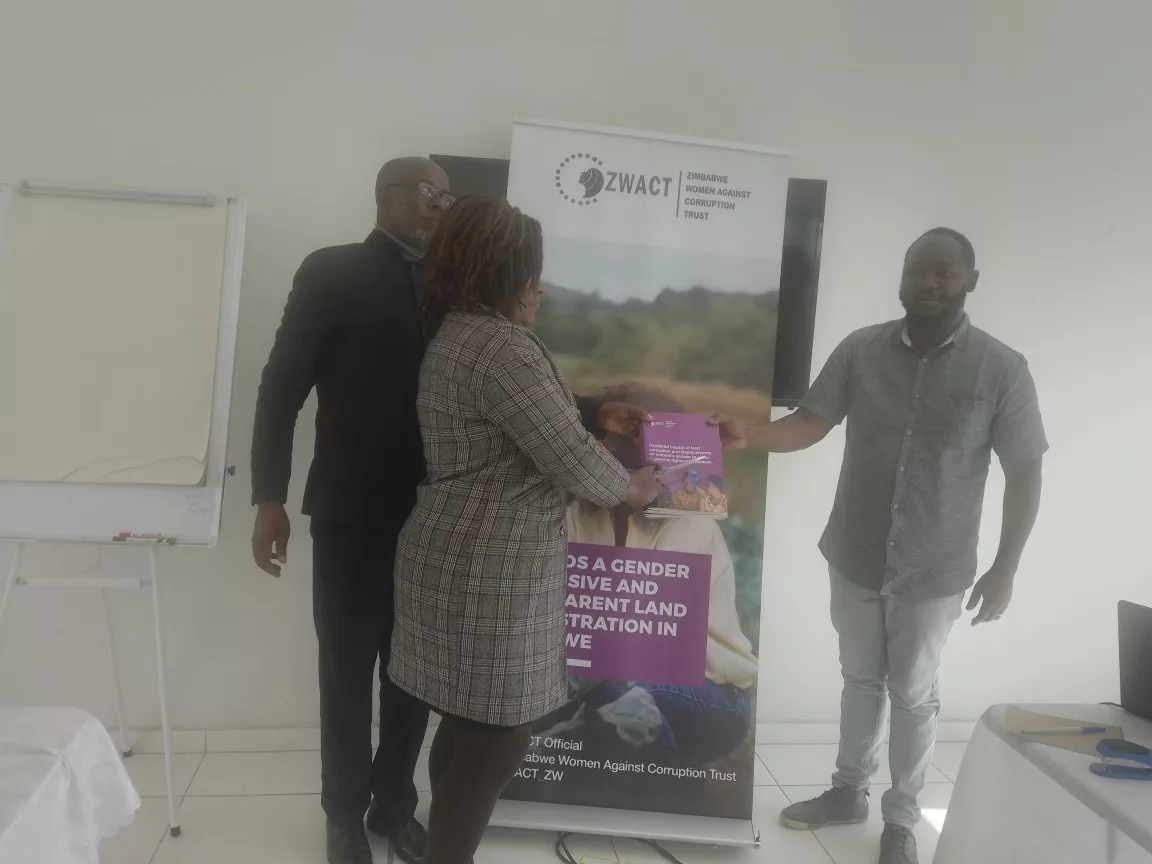|
Getting your Trinity Audio player ready...
|
Research by the Zimbabwe Women Against Corruption Trust (ZWACT) has shown that corruption is one of the key stumbling blocks hampering women from enjoying their access to land rights in Zimbabwe.
This emerged today at the launch of the ZWACT report titled “Gendered impact of land corruption and displacements on women’s access to socio-economic rights in Zimbabwe” held at the Kentucky Hotel in Harare.
The report gave special attention to victims of the 2023/4 internal displacements in the Masvingo and Manicaland Provinces of Zimbabwe.
“The research was commissioned to interrogate the extent to which women enjoy their access to land rights in Zimbabwe with special attention given to victims of the 2023/4 internal displacements in the Masvingo and Manicaland Provinces of Zimbabwe. In keeping thereof, the assessment examined the impact of the internal displacements on women’s land rights and enjoyment of human rights in general, shedding light on how these displacements affected women’s access to clean water and sanitation, food security, and reproductive health rights.
“The research methodologies used typically involved a combination of qualitative and quantitative approaches. Qualitative methods such as interviews, focus groups, and case studies were employed to gather in-depth insights and personal experiences from women who have been affected by land corruption and the displacements. These methods provided a nuanced understanding of the challenges and barriers faced by women in accessing and maintaining land rights,” said Allan Chaumba, the Lead Researcher.
The report revealed that in terms of land ownership, women still lag behind with only 2% claiming to be owning the land where they stay and also where they were evicted from in Manicaland and Masvingo Province. 98% did not own the land. Traditional leaders who had allocated them the land had done so in the names of their husbands who also did not have papers as proof of either legal occupancy or ownership.
The study noted that 70% confirmed having been given the land by the state through their traditional leaders with the jurisdiction of the government. Ten (10) percent confirmed having inherited it from their late parents and relatives who had died. Another 10% confirmed having bought it. However, that raised questions since communal land cannot be bought since it is state-owned. Further probing revealed that they had paid money to traditional leaders to get resettled, which speaks volumes about the prevalence of corruption in the land resettlement programme.
Proof of ownership of land is manifested through having Title Deeds, 99-year leases, or Certificates of Occupancy. The Study noted that the land where they occupied was not in their names.
The study confirms that customary law, traditional norms, and values are the leading obstacle (45%) followed by corruption (19%), inadequate legal and policy frameworks (9%), and the lack of implementation of existing legal and policy frameworks (9%). In addition, there appears to be a lack of political will (8%) to address these challenges because they existed during the pre-independence era and the same still exist 44 years after Zimbabwe’s independence in 1980.
Favouritism (35%) came prominently as the most common form of corruption which involves showing preferential treatment or giving unfair advantages to some individuals or groups based on personal relationships rather than based on a real need for land. This leads to inefficiencies and incompetence in decision-making processes. This is followed by nepotism (29%) in which individuals in positions of power or authority show preferential treatment to their family members or friends, often at the expense of more deserving and qualified candidates.
Bribery scored 24% in which public officials and traditional leaders are offered items of value (such as money, livestock, gifts, or favors) to give land to the landless. Women lamented being poor and unwilling to give such bribes and that explains why some of them do not have land even if they wanted to pay the bribes. In addition, 6% of the respondents accused public officials of demanding sexual favours in exchange for land.






